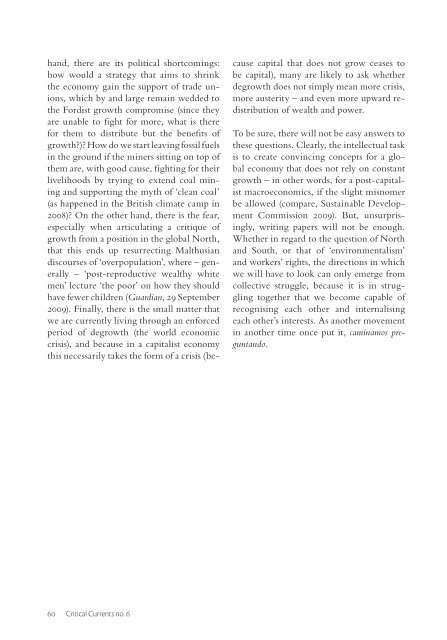Contours of Climate Justice - Dag Hammarskjöld Foundation
Contours of Climate Justice - Dag Hammarskjöld Foundation
Contours of Climate Justice - Dag Hammarskjöld Foundation
You also want an ePaper? Increase the reach of your titles
YUMPU automatically turns print PDFs into web optimized ePapers that Google loves.
hand, there are its political shortcomings:<br />
how would a strategy that aims to shrink<br />
the economy gain the support <strong>of</strong> trade unions,<br />
which by and large remain wedded to<br />
the Fordist growth compromise (since they<br />
are unable to fi ght for more, what is there<br />
for them to distribute but the benefi ts <strong>of</strong><br />
growth?)? How do we start leaving fossil fuels<br />
in the ground if the miners sitting on top <strong>of</strong><br />
them are, with good cause, fi ghting for their<br />
livelihoods by trying to extend coal mining<br />
and supporting the myth <strong>of</strong> ‘clean coal’<br />
(as happened in the British climate camp in<br />
2008)? On the other hand, there is the fear,<br />
especially when articulating a critique <strong>of</strong><br />
growth from a position in the global North,<br />
that this ends up resurrecting Malthusian<br />
discourses <strong>of</strong> ‘overpopulation’, where – generally<br />
– ‘post-reproductive wealthy white<br />
men’ lecture ‘the poor’ on how they should<br />
have fewer children (Guardian, 29 September<br />
2009). Finally, there is the small matter that<br />
we are currently living through an enforced<br />
period <strong>of</strong> degrowth (the world economic<br />
crisis), and because in a capitalist economy<br />
this necessarily takes the form <strong>of</strong> a crisis (be-<br />
60 Critical Currents no. 6<br />
cause capital that does not grow ceases to<br />
be capital), many are likely to ask whether<br />
degrowth does not simply mean more crisis,<br />
more austerity – and even more upward redistribution<br />
<strong>of</strong> wealth and power.<br />
To be sure, there will not be easy answers to<br />
these questions. Clearly, the intellectual task<br />
is to create convincing concepts for a global<br />
economy that does not rely on constant<br />
growth – in other words, for a post-capitalist<br />
macroeconomics, if the slight misnomer<br />
be allowed (compare, Sustainable Development<br />
Commission 2009). But, unsurprisingly,<br />
writing papers will not be enough.<br />
Whether in regard to the question <strong>of</strong> North<br />
and South, or that <strong>of</strong> ‘environmentalism’<br />
and workers’ rights, the directions in which<br />
we will have to look can only emerge from<br />
collective struggle, because it is in struggling<br />
together that we become capable <strong>of</strong><br />
recognising each other and internalising<br />
each other’s interests. As another movement<br />
in another time once put it, caminamos preguntando.
















